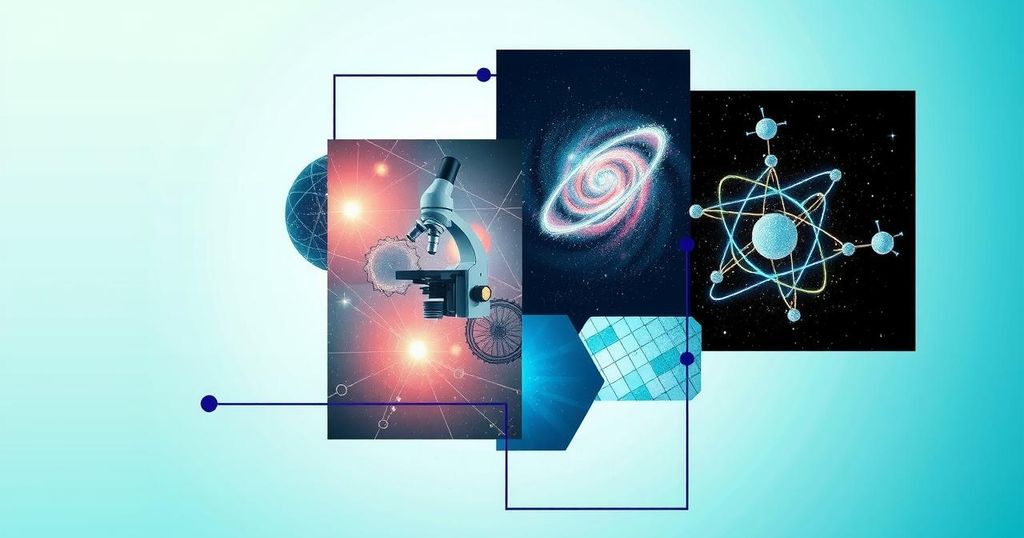Science
BIESECKER, DAILY NEWS EGYPT, DNE, ENVIRONMENTAL IMPACT, EUROPE, EUROPEAN SOUTHERN OBSERVATORY, FLORIAN BIESECKER, GERMANY, GLOBAL WARMING, MAX PLANCK INSTITUTE FOR NEUROSCIENCE, MY, NATURE COMMUNICATIONS, NATURE NEUROSCIENCE, RESEARCH, SCIENCE, SPACE EXPLORATION, SUSTAINABILITY, UNIVERSITY OF COLOGNE
James O'Connor
0 Comments
DNE Reviews 10 Groundbreaking Scientific Discoveries Transforming 2024
In 2024, scientific research flourished despite global challenges like the COVID-19 pandemic and climate change. Daily News Egypt enumerates ten pivotal studies that reshaped understanding across various fields, including astronomy, neuroscience, and archaeology, proposing novel theories and solutions to long-standing questions.
In 2024, the scientific community celebrated a year marked by revolutionary discoveries across various fields, as researchers tackled pressing global issues originating from the COVID-19 pandemic, socio-economic challenges, and the urgent need for solutions to climate change. Daily News Egypt (DNE) shines a light on ten exceptional studies that not only propelled scientific understanding but also overturned longstanding convictions, paving the way for advancements in medicine, physics, and archaeology.
One of the year’s highlights in astronomy was the identification of a binary star named “D9,” located near a supermassive black hole. This groundbreaking discovery, which utilized data from the European Southern Observatory’s Very Large Telescope, reveals that binary stars can endure in extreme gravitational fields. Florian Biesecker, the study’s lead author, believes this could change our perception of black holes and aid in discovering new celestial bodies.
In neuroscience, researchers unveiled a novel pathway for forming long-term memories, independent of short-term memories, signifying a major shift in understanding memory dynamics. By employing optogenetics to inhibit the CaMKII enzyme in mice, they successfully mapped a pathway dedicated to long-term memory. “It’s like finding a secret path to a permanent gallery in the brain,” explains Myung Shin, the lead author of the study.
Concerning adolescent mental health, a significant study revealed that children bullied at age 11 showed a higher likelihood – three and a half times greater – of developing mental health issues by age 17. This longitudinal study tracked 10,000 UK children over two decades, providing valuable insights for creating interventions to combat bullying’s harmful effects. George Slavich, the lead author, emphasizes the importance of these findings for schools and communities.
Additionally, a comprehensive analysis uncovered that breast cancer survivors are at heightened risk for developing secondary cancers such as endometrial and pancreatic cancers. This revelation, published in The Lancet Regional Health Europe, demonstrated that socio-economic factors exacerbate these risks. Isaac Allen, the lead researcher, noted the implications for treatment protocols that consider these elevated risks.
In archaeology, researchers identified ancient cases of Down syndrome dating back 5,000 years in Greece, Bulgaria, and Spain, as well as more recent instances in Finland. Their findings challenged perceptions regarding the prevalence of genetic abnormalities in history, showcasing that four out of 35 infants in a burial site exhibited chromosomal discrepancies. Adam Rohlach, the lead author, found the results surprisingly high for that era.
Technological advances were also prominent, with a study indicating that floating photovoltaic (FPV) solar panels could meet significant electricity demands if deployed over bodies of water. An analysis of 68,000 lakes showed that covering just 10% with FPV panels could annually produce enough energy for countries like Papua New Guinea and Ethiopia. Esten Woolway noted that this approach contributes to environmental conservation too.
Furthermore, researchers mapped the origins of Arabica coffee, tracing its genetic lineage back over 600,000 years. This study emphasized the plant’s vulnerability to pests due to low genetic diversity. Victor Albert, a co-author, articulated the necessity of understanding genetic composition to secure coffee’s future against climate challenges.
Roboticists and scientists simulated movements of ancient sea creatures transitioning to land, enriching our knowledge of evolutionary biology. They built robotic models to explore ancient adaptations nearly 390 million years ago. Michael Ishida, a co-author, remarked on the importance of interdisciplinary methods for illuminating how species adapt to environmental changes.
Finally, an archaeological analysis proposed that the construction of the Pharaoh Djoser’s Pyramid utilized a hydraulic lift system to move heavy stones efficiently. The research indicated that water routes within the pyramid facilitated this engineering marvel. Xavier Landru, the lead author, highlighted the significance of this discovery, unearthing a blend of ingenuity and resourcefulness in ancient Egypt.
In 2024, scientific research experienced a pivotal year fueled by the challenges of the post-pandemic world, including economic struggles and an urgent need for climate action. These global issues catalyzed significant strides in multiple disciplines such as astrophysics, neuroscience, mental health, and archaeology. Daily News Egypt (DNE) captures ten influential studies that not only advanced existing scientific knowledge but also questioned long-standing beliefs, providing invaluable insights for the future.
The extraordinary discoveries of 2024 reflect not only the fruits of human curiosity and resilience but also the interconnectedness of knowledge across disciplines. From the vast expanse of space with the discovery of a binary star near a black hole to the intricate workings of human memory and innovative solutions for sustainable energy, these studies set the stage for future exploration and understanding. As researchers continue to uncover the complexities of life, society stands to benefit, fostering a deeper appreciation for scientific inquiry and its practical applications.
Original Source: www.dailynewsegypt.com




Post Comment